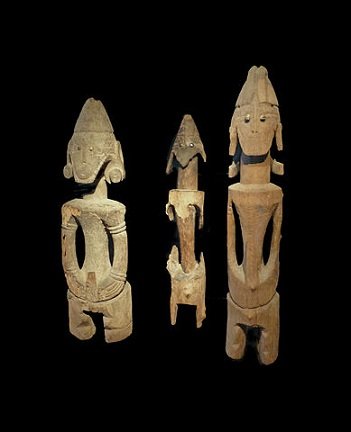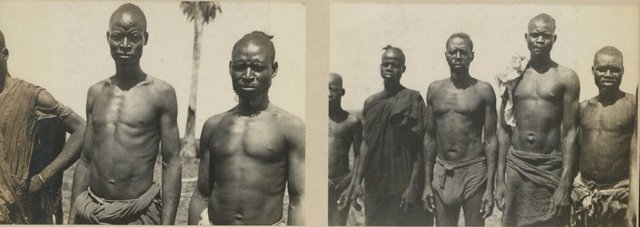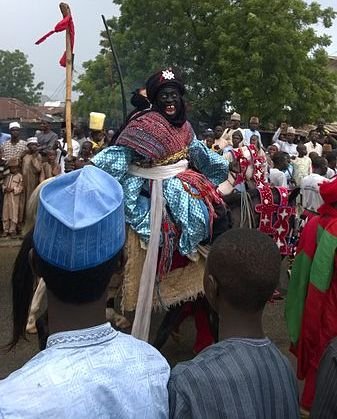History Of Northern Nigeria [Part 5] - Jukun In The Pre-colonia Era
Welcome to the part 5 of our survey of the history of the Northern part of Nigeria. We've reviewed the Hausa/Fulani, Kanem-Bornu, Nupe, and Igala extensively and we looked at their influence and the roles they played in the history of Nigeria. Here, we will look at yet another ethnic group that played a very vital role in the history of Nigeria; the Jukun ethnic group. Y'all will find out why Jukuns were very strategic in the pre-colonial era in Nigeria.

Jukun Ethnic Group
Remember we discussed the Igala ethnic group in our last post - people were excited by the fact that Igala supports women as their administrative head and king (Attah). I'm sure you will be more excited to know that, in the pre-colonial era, Jukun raised women warlords that led the ethnic group to victory. Okay, just to let you know; Jukuns are very remarkable and known warriors and warlords - no wonder they were forces to be reckoned with in the pre-colonial era.
Jukun ethnic group is also called "Kwararafa or Wapan" by the locals and they are presently found around the North-central and North-western region of Nigeria. Some of the territories occupied by the Jukuns were gotten through combat and they were known to be very brutal at war. At a point in history, they staged a war against a much larger Hausa ethnic group. Even till this present time, the combat spirit is still very alive in them. A few weeks back, a news made a major headline in Nigeria about the clash between the Jukuns and another ethnic group called "Tiv" [ref]. Even with their combat spirits, Jukuns are relatively accommodating and peaceful, but undefeated in battle - you wouldn't want to mess around with them. The population of Jukun in Nigeria is just a little above 1 million (according to the 2006 Nigerian Population Census), though there are native Jukun speakers spread across Africa and diaspora.
It may interest you to know that Jukun was the only ethnic around the Kano region (North-western region of Nigeria) in the pre-colonial era that never submitted to the supremacy of Yaji (one of the leaders of the defunct Kano emirate) - the reason is that, they never conquered Jukun. Even though Jukuns are still strong, they are not as strong as they used to be because of dissention and conflict of interest that rose up within them, and a major disintegration crept in. This was what led to the historic fall of the ancient Kwararafa (Wapan, Jukun or Wukari) empire. Humorously, Kwararafa was not conquered by forces from outside but by forces within.
Origin of Jukun
Just to make terms clear; I have used "Jukun, Kwararafa, and Wapan" interchangeably. However, there was a difference in the pre-colonial era, though the difference is not taken into much consideration now. Here's the difference: Kwararafa was a legendary, powerful and mythical empire that was believed to be the ancestors of the present day Jukuns. This empire covered parts of North-east, North-central, North-west and even parts of the middle-belt. However, at the fall of Kwararafa, another empire rose to succeed Kwararafa and it was called Wukari. Presently, Wukari is the center and administrative capital of the Jukuns - this is the reason the three terms are used interchangeably.
Just like the other Northern ethnic groups we have reviewed, Jukun has many versions of their oral tradition which includes myths and legends. We will look at the ones generally accepted by Jukun people.
The Version of Kano Chronicles
This version talks about the later Jukun empire after the fall of the former one (Kwararafa). It is believed that after the fall of Kwararafa, the Jukuns that were left raided the North-western part of Nigeria (Kano, to be precise), the result of this raid led to the establishment of a territory around Kano and some other Northern states like Bornu. By inference, if the Jukuns raided the old Kano region which was among the earliest established Hausa states, then Kwararafa must have existed long before some Hausa states.

The origin of the first Kwararafa has not been understood but some history scholars have said that they may have come from the middle east; the region around Yemen. This statement has neither been approved nor rejected because of lack of records, but some cultural practices have provided some pointers to the similarity in tradition of both the Jukuns and the Arabias - particularly the dressing pattern. If you have been to the North-western part of Nigeria and some other South Saharan regions, you will agree with me that their dressing looks "Arabic".
Jukun Administration and Socio-political Organization
Just like we talked about earlier, during the pre-colonial era, Jukun was large and powerful and was referred by many as confederation. The administration of Jukun is majorly based on theocratic system where the spiritual head known as "Aku Uka" is selected and functions as the political head too. Aku Uka has both spiritual and administrative oversight over the land of Jukun. Aku Ukas are normally the commander in chief of the Jukun armed forces, though he appoints warlords to lead each battalion.

During the pre-colonia era, even though Aku Uka wielded tremendous power, his administration was supervised by councillors which were made up of elites and titled nobilities. These included Abo-Acho (King's advisor on civil duties), Abon Ziken (Assists the Abo-Acho and functions in full capacity as Abo-acho in his absence), Abo Nta (in charge of Jukun warriors) etc. Just to let you know, the current Abo Nta of Wukari is the renowned General T.Y Danjuma - this should let you know how combat-ready the Jukuns are.
The political structure of Jukun has remained very complex. Jukun is one of the very few ethnic groups in nigeria where the king is ordained as a priest and seen as a semi-divine being. Even till this present time, the ordination of the king (Aku Uka) is seen as very sacred because they believe that the Aku Uka is the messenger of the almighty which is sent to represent the gods here on the earth.
Authored by @samminator
Click on the coin to join our Discord Chat

Witness proposal is here:
Go To Steem Witness Page
In the bottom of the page type: adsactly-witness and press vote.

Use small letters and no "@" sign. Or, click here to vote directly!
Thank you!
I find it interesting that still, in some peoples of the world, the administration is respected as peoples and their political organization in spite of the constitution that can govern a country. In Venezuela, I believe that only one indigenous ethnic group has its own code. I am not sure. I also find it interesting that you mention that the Jukun trained women for war and that they were warriors to fear. In this same order, it is impressive that even war, struggle, is one of the ways to settle differences between peoples. I think we still have a long way to go. Interesting information, and as I said before: I am learning from their culture. Thank you for this post, @sammminator
Thanks Nancy. Yeah, the Jukuns were fearless in battle and that's because both men and women were trained equally in their army.
Here in Nigeria, there are many ethnic groups with their various governing codes.
Thanks for reading Nancy
I wont lie, I am enjoying all the history you dropping bro. I am feeling so refreshed going through these history. I must commend your great work @samminator, you nailed and did justice to this. Thanks for enlighten me on some of the cool history I must have missed out on.
Thanks bro. I'm so honoured to share some pieces of Nigerian history with y'all
Jukuns are known to be warriors, they are fearless, and can face anybody. My concern about them is the rate at ia which they are in constant fight with the Tiv in benue and also in Plateau state in Nigeria. They are the ones you will see most in Nigeria Army. Thanks @samminattor and @adsactly for bringing the history of Nigeria to limelight.
You're right bro. The fight has become something else. Even a few weeks ago, I major combat was reported by the media about the clash between Jukun and Tiv. Let's hope they'll settle someday. Thanks for reading buddy
This post is manually curated by @azizbd and received an upvote from @SchoolForSDG4
School For SDG4
A School For Social and Educational Development of Underprivileged Children
Lol. Cool. Many thanks
Woah!!! This is another interesting, entertaining, educative and informative article. Great write-up @samminator. This is really great knowing different part of the northern part of Nigeria.
I won't mess with Jukun people. They are really warriors. The combat blood still runs in their veins.
This got me big time. I thought it's only Marvel movies that had female warriors 😃😃. I didn't know they were actually female warriors. That will be quite interesting to see. Only if we had a time machine.
Awesome write-up again @samminator. Loving this series. Can't wait for the part 6. Keep up the great work.
Hahahaha. The "time machine" part got me laughing hard. Even if there's time Machine, I dare not go back to the era of the first Jukun (Kwararafa), cos I might have my ass kicked by female warriors 😃😃
Thanks for reading bro
This is always the case, not only with warrior peoples but with conflicting groups all over. They tend to be eroded from the inside and destroyed by their own people.
I have always seen Africa's inability to gain political, social and religious stability (fully aware that I may be incurring ina gross overgeneralization) as the result of self-sabotage. So much has been argued about the damage empires made to 3rd world countries (the whole latin america included) and yet I think the greatest damage came from their own people.
I did not know T.Y Danjuma. Judging by his military and business career, it looks like he is one of the few men who have been able to succeed on both. Venezuelan military may learn a thing or two from him (has he been involved in any corruption or human rights violation scandals?).
Interesting to see that the Jukun still see kings as some sort of demi-gods.
Self-sabotage is one of the banes of most African society and this has cracked the black continent of Africa from within. This was the same reason the mighty Kwararafa fell. Well, I guess history doesn't teach lessons, because if it does, people would have learnt one or two things.
Thanks for reading Henry
Thank you for the insightful post. It is a real pity our countries do not learn from past errors. I hate when politicians use the anti-imperialist discourse to justify their corruption and ineptitude.
Here in Venezuela the chavistas proved without any doubt that even with all the money in the world and all the political power if the 3rd world leaders continue thinking about their personal vendetas, getting rich, and pursuing power for power's sake the empires can consider themselves exhonerated from any responsibility. These idiots are willing to rule over ashes.
Another great one by you @samminator.
Of course, I first read about Jukun ethnic group when I came across some accounts of Nigeria - Biafra civil war and the roles played by particularly TY Danjuma, the then bold L. Col. who was bold enough to effect the arrest of a sitting Head of State. Perplexed by his audacity, I digged deep to trace his ethnic group because I know he's not an Hausa.
This article corroborated the warrior attributes of people of Jukun, and it is a great contribution to the development of this country.
Thanks for yet again for another wonderful piece.
@eurogee
Exactly buddy. T.Y Danguma was very strategic during the Nigerian civil war. No doubt, the same fearless spirit of Jukun was alive in him and still alive even till now.
Thanks for reading buddy
@samminator, If we want to find the Uniqueness of particular Tribe and Culture then definitely we can see that essence in their Parade and Cultural Celebrations.
Posted using Partiko Android
Exactly. I very well agree with this. People's cultures are shown by how they live
Yes.
Posted using Partiko Android
It gives me great joy that this article illustrates the patterns of inter-group relations in the northern part of Nigeria and focuses on Jukun’s historic relations with other ethnic groups such as the Tiv and others from the understanding of modern conflict theory and the ethno-consensus theory of inter-group relations.
It sure feels good to revisit histories once in a while.
Good post as always.
Thanks buddy. History of Nigeria should be revisited from time to time so that we can appreciate the richness of our cultural heritage.
Thanks for reading buddy
Thanks for teaching us again this great history in Nigeria. African history is awesome:))
Posted using Partiko Android
It has been my honour to expose people to the history of Africa. I'm glad you found the post educative
You are so welcome
Posted using Partiko Android